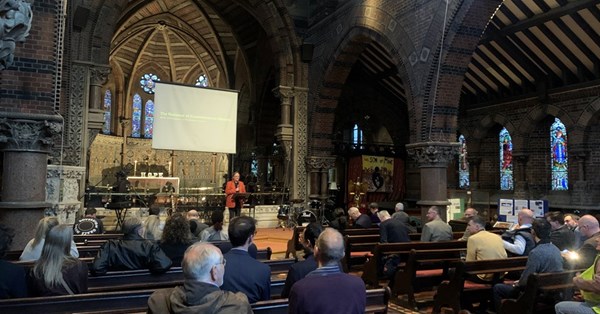“WE BELONG, and this is our home,” members of the congregation at the Church of England Evangelical Council’s (CEEC) alternative to a chrism eucharist were told on Wednesday evening.
There were about 40 people present at the service in St James the Less, Pimlico, in London. Of them, two-thirds were clergy. The retired Bishop of Willesden, the Rt Revd Pete Broadbent, the only bishop present, preached.
A further 70 attended an online service held on Tuesday, the CEEC says. Last year, an online service attracted only about 25 viewers.
Provision was scaled up this year to meet demand, and to further the development of a “de facto parallel province” for opponents of the introduction of church blessings for same-sex couples (News, 20 March).
In her introduction, the Vicar of St James the Less, the Revd Lis Goddard, referred to those attending as “people who have felt out in the cold” in the C of E.
“We are very aware that the Church of England is in a complicated place. Nothing is settled, and so we not settled,” she said, but she assured the congregation that the C of E “is our home”.
In his address, Bishop Broadbent explained the functions of a chrism eucharist. It was not a tradition that many Evangelicals were familiar with, he said, but, in the past, he had found it a “very valuable service”, both for the affirmation of ordination vows and in fostering a sense of kinship among the clergy.
He was, however, no longer attending the diocese of London’s chrism mass in St Paul’s, he said. “For me, [the decision] comes from a feeling of being out of fellowship with the bishops I used to serve with.”
The CEEC service was billed as a “renewal of commitment to ministry with affirmation of ordination vows”. It did not contain a eucharist, or the blessing of chrism oils. “If you want your oils, you can get them elsewhere,” Bishop Broadbent joked.
The purpose of reaffirming ordination vows in a group setting, he said, was to “hold each other to account”. He warned against complacency, and quoted St Paul’s words to the Corinthians, heard in the reading, about having “renounced shameful and underhand ways”.
“We have to confess, we haven’t always lived up to that,” Bishop Broadbent said, referring to the cases of John Smyth and Mike Pilavachi, in which abuse had been covered up in Evangelical church settings, as examples. Evangelicals had to beware “our propensity towards becoming Pharisees”.
After the service, the Assistant Curate of St Hugh’s, Lutton Lewsey, in the diocese of St Albans, the Revd Chris Burrows, told the Church Times that Bishop Broadbent’s challenge to the congregation to hold one another accountable was an important one.
In St Albans diocese, Evangelicals opposed to the introduction of blessings of same-sex couples had decided to continue to engage at deanery and diocesan levels on strategy and other elements of church life. Affirming ordination vows, however, was different, he said. It felt necessary to have “spiritual oversight” from a bishop who shared the same view.
It was important to have a “proportionate reaction” to the changes in the Church of England, and not “commit ecclesiastical suicide” by severing all links, Mr Burrows said.
A long-serving vicar in the diocese of London, who did not want to be named, expressed his hope that a separate structure for opponents of the introduction of blessings for same-sex couples would enable him to remain in the C of E — the Church into which he had been born, and in which his father had also been a vicar.
“The Church of England is what I feel part of, and what I now feel robbed of,” he said. “There has to be space for everyone to hold their integrity . . . but at the moment it feels like you have to be ‘one of us’ [in favour of blessings for same-sex couples] or somewhere else.”
He said that he had previously attended the diocese of London’s chrism eucharist in St Paul’s, and would still have considered attending this year, if he hadn’t been on holiday.
The High Church service was “culturally alien” to his parish work, he said, but, like Bishop Broadbent, he had valued the collegiality of the event, and the opportunity to renew his ordination views.
He regarded himself as “less extreme” than some of those involved in the work of the CEEC, and said that he was still grappling with exactly how to respond to the changes brought about by the Living in Love and Faith (LLF) process.
But he hoped that structural provision would be provided for opponents of the introduction of the blessings, for everyone’s sake. “The anxiety would go away, and then we can start to work out how to work together again,” he said.
















